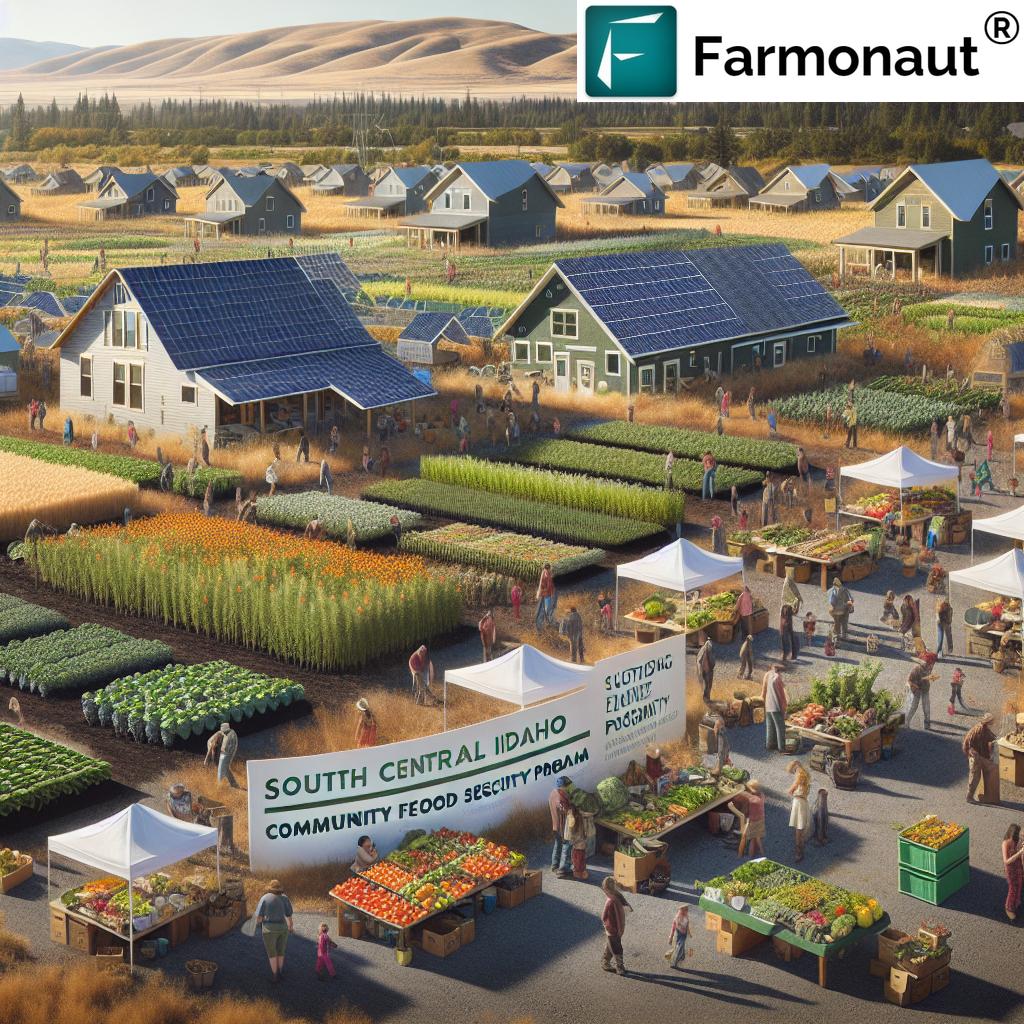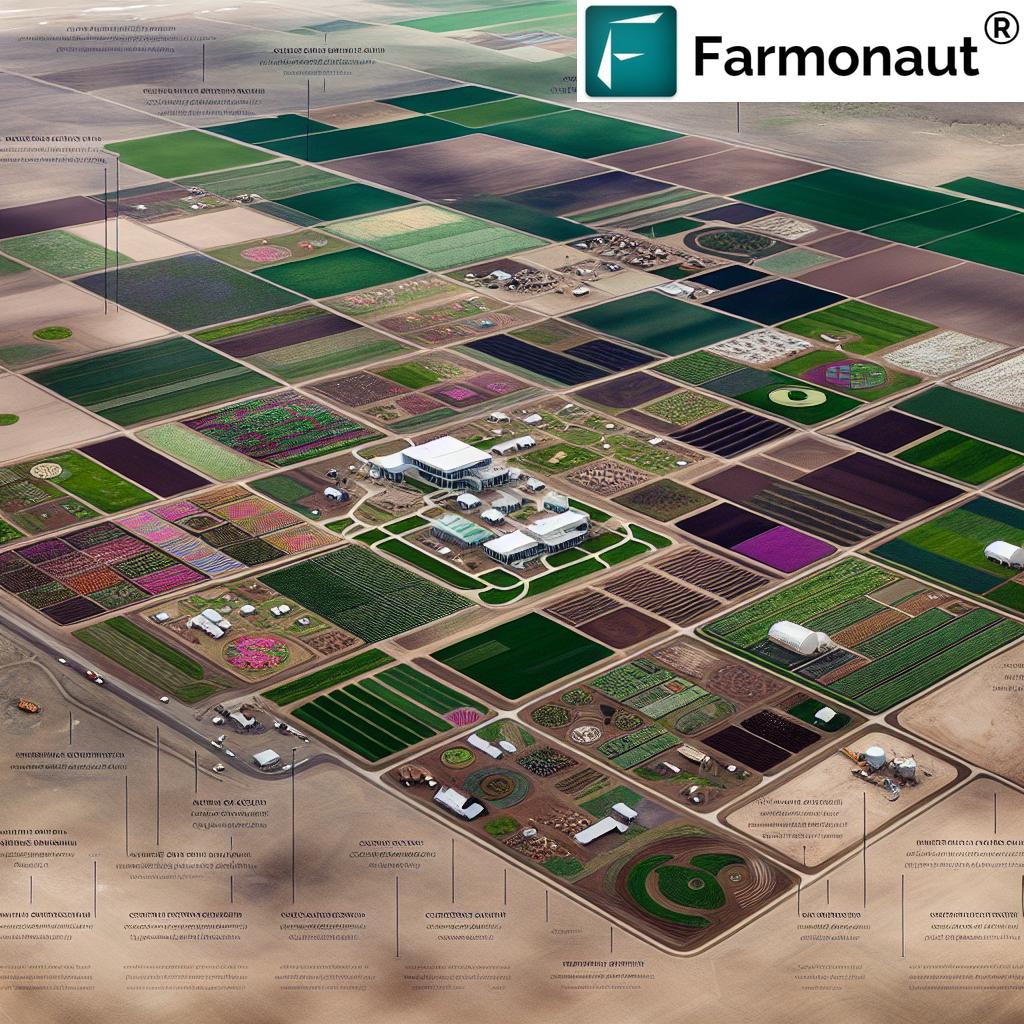Transforming Rural Idaho: Sustainable Agriculture and Community Development for Food Security
“Over 40 years, a nonprofit leader in Idaho transformed rural communities through sustainable agriculture and food security initiatives.”
As we delve into the inspiring tale of rural transformation in Idaho, we’re reminded of the profound impact that sustainable agriculture practices and community food security initiatives can have on uplifting entire regions. Our journey takes us through the heart of south central Idaho, where one man’s dedication to combating poverty blossomed into a legacy of hope and resilience for countless families.

The Genesis of a Community-Driven Movement
In 1979, a young Ken Robinette was simply looking for work to get through the harsh Idaho winter. Little did he know that his search would lead him to the South Central Community Action Partnership (SCCAP), setting the stage for a 45-year journey dedicated to transforming lives through agricultural poverty reduction and innovative community programs.
Initially hired for the organization’s weatherization program, Robinette quickly learned the ropes of farm weatherization techniques, a crucial first step in addressing the immediate needs of rural families struggling to keep their homes warm during the unforgiving winter months. This experience laid the foundation for what would become a comprehensive approach to sustainable agriculture and community development.
Expanding Horizons: From Weatherization to Holistic Community Support
As Robinette’s role within SCCAP grew, so did the organization’s scope and impact. The journey from simple farm weatherization to a multi-faceted approach addressing hunger, housing, and economic stability is a testament to the power of adaptive community-focused initiatives. Let’s explore the key milestones that shaped this remarkable transformation:
- Farm Weatherization Program: The initial focus on preparing homes for winter not only improved living conditions but also reduced energy costs for struggling families.
- Food Support Programs: Recognizing the critical link between agriculture and food security, SCCAP expanded to include initiatives like the “60 Hours to Fight Hunger” turkey drive, addressing immediate hunger needs while building community engagement.
- Self-Help Housing Program: This innovative approach allowed low-income families to build their own homes, fostering a sense of ownership and community while addressing the pressing need for affordable housing.
- Utility Assistance: Building on the success of weatherization efforts, programs were developed to help families manage rising energy costs.
- Homeless Services: Recognizing the interconnected nature of poverty, SCCAP expanded its reach to provide support for those experiencing homelessness.
These diverse programs showcase the evolution of SCCAP’s mission, from addressing immediate needs to fostering long-term sustainability and self-sufficiency within the community.
The Power of Sustainable Agriculture in Community Development
At the heart of SCCAP’s success lies a deep understanding of the role that sustainable agriculture plays in building resilient communities. By focusing on agricultural community development, the organization has been able to address multiple facets of rural poverty simultaneously:
- Economic Stability: Sustainable farming practices help reduce input costs and improve yields, providing a more stable income for rural families.
- Food Security: Local food production and distribution networks ensure that fresh, nutritious food is accessible to all community members.
- Environmental Stewardship: Promoting sustainable agriculture techniques helps preserve the land for future generations while reducing the environmental impact of farming activities.
- Community Cohesion: Initiatives like community gardens and farmer’s markets foster social connections and a sense of shared purpose.
By intertwining these elements, SCCAP has created a holistic approach to poverty reduction that goes beyond temporary relief, instead building the foundation for long-term prosperity.
“A single organization’s efforts in south central Idaho expanded from farm weatherization to addressing hunger and housing issues.”
Innovative Solutions for Evolving Challenges
As the landscape of rural poverty evolved over the decades, so too did SCCAP’s strategies for addressing it. The organization’s ability to adapt and innovate has been crucial in maintaining its relevance and effectiveness. Some key innovations include:
- Self-Help Farming Initiatives: Empowering families to grow their own food through education and resource provision.
- Partnerships with Local Farmers: Collaborating to ensure surplus produce reaches those in need, reducing waste and improving food security.
- Technology Integration: Utilizing modern agricultural technologies to improve efficiency and sustainability in farming practices.
- Financial Literacy Programs: Equipping community members with the knowledge to manage resources effectively and build financial stability.
These initiatives demonstrate the organization’s commitment to not just providing temporary relief, but equipping community members with the tools and knowledge to break the cycle of poverty.

The Role of Technology in Modern Agricultural Community Development
In today’s rapidly evolving agricultural landscape, technology plays a crucial role in enhancing productivity, sustainability, and community resilience. While SCCAP’s journey began with hands-on, grassroots efforts, the integration of modern agricultural technologies has become increasingly important in addressing contemporary challenges.
One such technological solution that aligns with the goals of sustainable agriculture and community development is Farmonaut. As a pioneering agricultural technology company, Farmonaut offers advanced, satellite-based farm management solutions that can significantly benefit rural communities like those in south central Idaho.
Farmonaut’s platform provides valuable services such as:
- Real-time crop health monitoring
- AI-based advisory systems
- Resource management tools
These tools can help local farmers optimize their practices, reduce resource wastage, and improve crop yields – all of which contribute to greater food security and economic stability within the community.
To explore how Farmonaut’s technology can support sustainable agriculture initiatives, visit their web application or download their mobile apps:
The Impact of Long-Term Commitment to Community Development
The story of SCCAP and Ken Robinette’s 45-year journey is a powerful testament to the impact of long-term commitment in community development. By consistently adapting to meet the changing needs of the community, the organization has created lasting change that extends far beyond immediate relief efforts.
Some of the long-term impacts observed include:
- Generational Change: Families who benefited from early programs have seen improved opportunities for their children and grandchildren.
- Community Resilience: The diverse range of programs has created a safety net that helps the community weather economic downturns and natural disasters.
- Sustainable Food Systems: By promoting local agriculture and food distribution, SCCAP has helped create a more sustainable and resilient local food system.
- Improved Quality of Life: From better housing to increased food security, the overall quality of life for many in the community has significantly improved.
These lasting impacts underscore the importance of sustained, community-focused efforts in creating meaningful change.
Timeline of Sustainable Agriculture Initiatives in Rural Idaho
| Year | Initiative/Program | Focus Area | Estimated Impact | Community Benefit |
|---|---|---|---|---|
| 1979 | Farm Weatherization Program | Energy Efficiency | 500 homes improved | Reduced energy costs, improved living conditions |
| 1985 | Food Bank Partnership | Hunger Relief | 1,000 families served annually | Increased food security, community engagement |
| 1990 | Self-Help Housing Program | Affordable Housing | 100 homes built | Homeownership opportunities, skill development |
| 2000 | Expanded Utility Assistance | Energy Support | 2,500 households assisted | Financial relief, prevented utility shut-offs |
| 2010 | Community Garden Initiative | Local Food Production | 10 gardens established | Fresh produce access, community building |
| 2015 | “60 Hours to Fight Hunger” Drive | Hunger Relief | 5,000 turkeys distributed annually | Holiday meal security, community tradition |
| 2020 | Sustainable Farming Education | Agricultural Training | 200 farmers trained | Improved crop yields, sustainable practices |
| 2023 | Comprehensive Poverty Reduction | Multi-faceted Support | 18,000 individuals assisted | Holistic community improvement, resilience |
Challenges and Opportunities in Rural Agricultural Development
While the successes of SCCAP and similar organizations are remarkable, the journey of rural agricultural development is not without its challenges. As we look to the future, several key issues and opportunities emerge:
- Climate Change: Shifting weather patterns and extreme events pose new challenges for farmers, requiring adaptive strategies and resilient farming practices.
- Economic Pressures: Rising costs of living, coupled with fluctuating agricultural markets, continue to put pressure on rural families.
- Technological Integration: While new technologies offer immense potential, ensuring equitable access and adoption remains a challenge.
- Demographic Shifts: As younger generations move to urban areas, maintaining vibrant rural communities becomes increasingly important.
These challenges also present opportunities for innovation and community-driven solutions. By leveraging the strengths of rural communities and embracing sustainable agriculture practices, organizations like SCCAP can continue to make a significant impact.
The Future of Sustainable Agriculture and Community Development
As we look ahead, the future of sustainable agriculture and community development in rural Idaho and beyond is bright, but requires continued dedication and innovation. Some key areas of focus for the future include:
- Technology Integration: Embracing tools like Farmonaut’s satellite-based crop monitoring can help farmers optimize their practices and improve yields. For more information on how technology can support sustainable agriculture, visit Farmonaut’s API Developer Docs.
- Education and Skill Development: Continuing to provide training and resources for sustainable farming practices and financial literacy.
- Collaborative Partnerships: Strengthening ties between nonprofits, local governments, and private sector entities to create comprehensive support networks.
- Policy Advocacy: Working to shape policies that support sustainable agriculture and rural development at local, state, and national levels.
- Youth Engagement: Developing programs that inspire the next generation to see the value and opportunity in rural agricultural communities.
By focusing on these areas, we can build upon the foundation laid by organizations like SCCAP and continue to transform rural communities through sustainable agriculture and comprehensive development initiatives.
Conclusion: A Legacy of Hope and Resilience
The story of Ken Robinette and the South Central Community Action Partnership is more than just a tale of one organization’s growth. It’s a powerful testament to the transformative potential of sustainable agriculture and community-driven development initiatives. From its humble beginnings in farm weatherization to its current status as a comprehensive poverty-fighting agency, SCCAP’s journey illustrates how dedicated efforts can create lasting change in rural communities.
As we face the challenges of the 21st century, the lessons learned from this 45-year journey in rural Idaho offer invaluable insights for communities worldwide. By embracing sustainable agriculture practices, fostering community food security, and leveraging innovative technologies, we can build resilient, thriving rural economies that provide opportunities for all.
The legacy of hope and resilience built by SCCAP serves as an inspiration and a roadmap for future efforts in agricultural community development. It reminds us that with dedication, adaptability, and a commitment to sustainable practices, we can create a future where rural communities not only survive but thrive.
FAQ: Sustainable Agriculture and Community Development
Q: What is sustainable agriculture?
A: Sustainable agriculture refers to farming practices that meet current food needs while preserving the ability of future generations to meet their own needs. It involves methods that protect the environment, public health, human communities, and animal welfare.
Q: How does sustainable agriculture contribute to food security?
A: Sustainable agriculture enhances food security by improving long-term crop yields, preserving soil health, reducing environmental impact, and creating more resilient local food systems that can better withstand economic and environmental challenges.
Q: What role do agricultural nonprofit organizations play in community development?
A: Agricultural nonprofit organizations like SCCAP play a crucial role in community development by providing education, resources, and support for sustainable farming practices, food security initiatives, and poverty reduction programs tailored to the specific needs of rural communities.
Q: How can technology support sustainable agriculture initiatives?
A: Technology, such as Farmonaut’s satellite-based farm management solutions, can support sustainable agriculture by providing real-time data on crop health, optimizing resource use, and offering AI-driven insights for better decision-making in farming practices.
Q: What are some challenges facing rural agricultural communities today?
A: Rural agricultural communities face challenges including climate change impacts, economic pressures, access to technology and resources, demographic shifts, and the need for sustainable practices that balance productivity with environmental stewardship.





